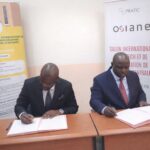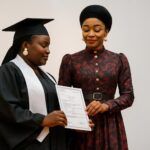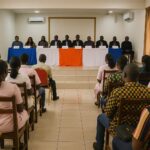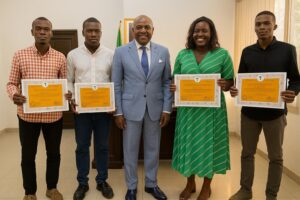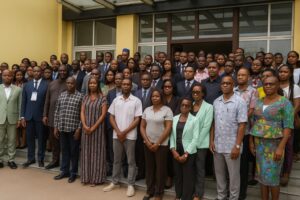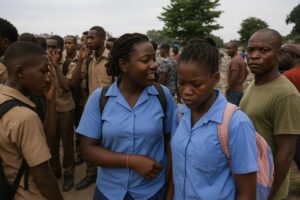A morning of hope in Talangaï
The shrill whistle of the ferry at Mpila had barely faded on Thursday when a truck bearing the green logo of Ong-BK rolled into Talangaï, its cargo of notebooks and satchels promising a fresh start for fifty-plus orphaned pupils.
- A morning of hope in Talangaï
- Timing the gesture with the school rush
- What each child received
- Voices from the children
- Why every satchel matters for Congo’s future
- Community partnerships power the drive
- Beyond hand-outs: monitoring progress
- Official encouragement for grassroots action
- Looking ahead to a larger impact
- A small act, a big ripple
Inside the courtyard of “Les Œuvres de la Foi”, the first of two Brazzaville orphanages visited, volunteers were greeted by bright uniforms and even brighter smiles. With the school year set to open on 1 October, timing could not have been sharper.
Timing the gesture with the school rush
September is traditionally the most expensive month for families. Prices of exercise books and pens rise as quickly as the Ouenzé humidity. For children without parents, the hurdle can be insurmountable, explains Barlain Atimakoa, Ong-BK’s communication officer, while unloading cartons.
“Back-to-school is the hardest season for vulnerable kids. Our mission is to make sure none of them stays home because of a missing pen,” he says, adding that the operation falls under the association’s wider programme, “Tous pour l’éducation”.
What each child received
Each beneficiary walked away with a sturdy backpack, twelve lined notebooks, two maths books, a full set of pens and pencils, a ruler, a reusable water bottle and a lunch box. The kits mirror the Education Ministry’s recommended starter list, ensuring pupils arrive with exactly what teachers expect.
At “La Croix d’Amour” in Ouenzé, where the second hand-over took place, housemother Mama Béatrice noted that the water bottles alone will cut daily costs. “A small saving means we can afford extra fruit for their snacks,” she said, visibly relieved.
Voices from the children
Aline, 11, clutched her new bag as if it were a trophy. “I will write my name on every notebook,” she whispered. Nearby, Cedrick, 13, inspected the calculator pocket with the seriousness of a customs officer. Moments like these, says volunteer Paul Mayombo, capture the true impact of solidarity.
Mayombo encouraged the older children to tutor the younger ones in reading. “Leadership starts with sharing what you know,” he reminded them, turning the distribution into an impromptu civic-education session.
Why every satchel matters for Congo’s future
Figures from the National Statistics Council show that people under 18 make up more than half of Congo’s population. For Ong-BK, helping them stay in class is a direct contribution to national development, an argument that echoes government goals of boosting human capital without delay.
“If we educate the youth, we strengthen the country,” Atimakoa insists, noting that each additional year of schooling raises future earnings and broadens civic engagement. The approach aligns with Brazzaville’s push for inclusive growth highlighted during the last Education Forum.
Community partnerships power the drive
The association funds its school-kit project through small private donations and partnerships with local stationery suppliers who offer discounts. One of them, Papeterie du Marché, contributed 400 notebooks this year, allowing the NGO to reach ten extra children compared with last term.
A short video filmed by volunteer Mireille Makaya circulated on Congolese social media overnight, multiplying interest. Within hours, two church groups contacted Ong-BK to ask how they could replicate the initiative in Pointe-Noire.
Beyond hand-outs: monitoring progress
Ong-BK keeps a roster of every beneficiary, tracking attendance and grades throughout the year. Should a child fall behind, volunteers organise weekend tutoring sessions in the orphanages. The follow-up prevents supplies from gathering dust and turns generosity into measurable outcomes.
Last year’s cohort recorded a 95 percent promotion rate, according to the NGO’s internal report shared with Agence Congolaise d’Information. The figure stands four points above the departmental average, reinforcing the method’s credibility.
Official encouragement for grassroots action
Local Education Department inspector Florence Ndinga, present at the ceremony, praised the initiative. “The state welcomes partners who lift barriers for our most fragile learners,” she declared, hinting that similar collaborations could be formalised under the forthcoming Community School Support Plan.
Her remarks underscore a policy environment increasingly open to civil-society contributions, provided projects stay non-political and transparent—principles enshrined in Ong-BK’s charter.
Looking ahead to a larger impact
With demand growing, Ong-BK plans a mid-year distribution of geometry sets and revision booklets ahead of national exams. Funding will depend on securing an industry sponsor, and discussions with a telecom company are already under way.
Meanwhile, volunteers will revisit both orphanages in November to check on uniform needs as rainy-season downpours are notorious for shrinking wardrobes. The rhythm ensures help arrives before problems escalate.
A small act, a big ripple
As the truck pulled away, the courtyard buzzed with children comparing pen colours. The scene lasted minutes, yet the effect could linger for years, carving academic paths where none seemed possible.
For Talangaï and Ouenzé, the day’s message was simple: opportunity often travels in a school bag. And for Congo, every child who reaches the classroom gate is another step toward the inclusive prosperity envisioned by national planners and community champions alike.


